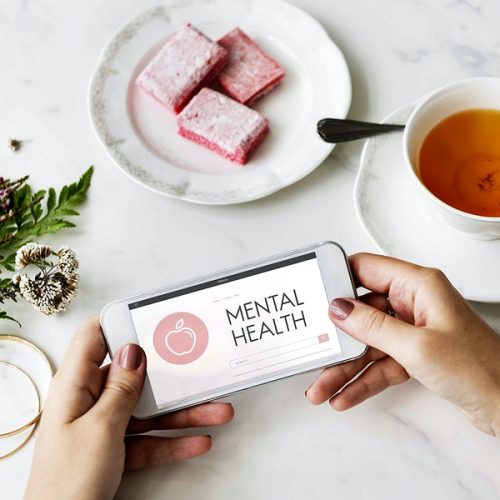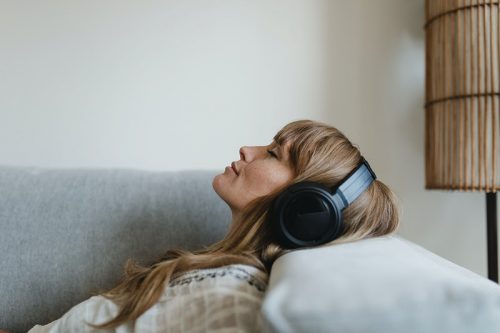
Source: rawpixel.com
Regardless of what mental disorders you are suffering from – a debilitating phobia, compulsive thoughts, panic attacks, or persistent worries – it is vital to know that you can live without fear and irrational worries. Treating mental health conditions can definitely help, and therapy is frequently the best choice for a lot of people with anxiety disorders. That is because therapy for anxiety symptoms, which is not the same as medication therapy, manages not only the problem’s symptoms. Therapy can help you ease anxiety by identifying the causes of your fears and apprehensions, learning how to calm the mind, better problem-solving and survival skills, and perceiving situations in fresh and less terrifying ways. Therapy provides you with the tools to deal with the condition and educates you on how to utilize them appropriately.
Therapy Should Be Customized To Your Particular Diagnosis And Symptoms
Anxiety vary significantly, so therapy should be customized to your particular diagnosis and manisfestation. For instance, if you have PTSD, your medical treatment is different from a person who requires help for panic attacks and other mental health conditions. The frequency and length of the therapy with a mental health professional are also dependent on the intensity and type. But many therapies for anxiety and depression are relatively brief. The American Psychological Association states that a lot of individuals do better considerably within eight to ten sessions.
Exposure Therapy And CBT
Various therapy forms are used and recommended to manage and relieve symptoms of anxiety, but the most common approaches are exposure therapy and cognitive-behavioral therapy (talk therapy). Each of these therapies treatment including therapy cbt may be utilized singly or together with other therapy forms. Anxiety therapy, particularly behavioral therapy cbt, may be done individually or with a group of individuals with the same signs and symptoms. However, the aim is the same: to reduce the level of your symptoms, overcome your terrors and apprehensions, and achieve peace of mind.

Source: rawpixel.com
What Are Some Of The Complementary And Alternative Remedies For Anxiety Disorder?
Anxiety is a common mental health condition that affects millions of people worldwide. According to the Anxiety and Depression Association of America, it is the most prevalent mental illness in the U.S. While medication and psychotherapy are traditional options to treat anxiety disorders, some people prefer to explore complementary and alternative treatments. These anxiety treatments can include mind-body techniques, herbal and dietary supplements, acupuncture, and other alternative therapies.
Mind-body techniques are popular alternative remedies for anxiety. These techniques, including meditation, yoga, and tai chi, focus on the connection between the mind and body. Meditation involves quieting the mind and focusing on breathing conditions, while yoga combines breathing techniques with physical postures. Tai chi is a Chinese martial art that involves slow, gentle movements and deep breathing.
Research has shown that mind-body techniques can be effective in reducing symptoms. In one study, participants who practiced meditation for eight weeks showed a significant decrease in symptoms compared to a control group. Yoga has also been shown to be effective in reducing anxiety symptoms, with one study finding that yoga was as effective as cognitive behavioral therapy in reducing anxiety. Tai chi has also been found to be effective in reducing the symptoms, with one study finding that it was more effective than traditional exercise in reducing anxiety.
Herbal and dietary supplements are another alternative treatment option for people experiencing this mental health condition. Common supplements include valerian root, kava, and omega-3 fatty acids. Valerian root is a natural sedative that has been shown to reduce symptoms and improve sleep quality. Kava is a plant that has been used in traditional medicine to treat anxiety and promote relaxation. Omega-3 fatty acids, found in fish oil supplements, have been shown to have a positive effect on mood and may also alleviate the symptoms.
While herbal remedies and dietary supplements can be effective in reducing symptoms, it is important to use caution when taking these supplements. Some supplements can interact with other anti anxiety medications or health conditions, and some may have potential side effects. It is important to consult with a healthcare professional before taking any supplements.
Acupuncture is another alternative option. Acupuncture involves the usage of thin needles. Professionals use these needles to poke into specific points on the body to stimulate energy flow. It is believed that this can help balance the body’s energy and lessens the symptoms.
Research has shown that acupuncture can be effective in reducing symptoms. In one study, participants who received acupuncture showed a significant reduction in anxiety symptoms compared to a control group. Acupuncture has also been shown to be effective in reducing symptoms of generalized anxiety disorder and post-traumatic stress disorder.
Other alternative remedies for anxiety include aromatherapy, massage, and chiropractic care. Aromatherapy involves using essential oils to entice relaxation and reduce symptoms. Massage can help promote relaxation and reduce muscle tension, which can be helpful for people with anxiety. Chiropractic care involves the manipulation of the spine to improve nervous system function and reduce symptoms.
While alternative treatment plans can be effective, it is important to approach them with caution. It is important to consult with a healthcare professional before trying any alternative options, as some may interact with other medications or health conditions. Additionally, some may not be covered by insurance and may be expensive.
What Type Of Therapy Is Best For Persons With This Type Of Anxiety Disorder?
CBT or Cognitive Behavioral Therapy, is the most popularly recommended remedy for anxiety disorders. Studies have proven that it effectively manages panic attacks, social anxiety or social phobia, generalized anxiety disorder, and different phobias, among others.
What Are The 6 Types Of This Disorder?
The six types include phobia, panic disorder, generalized anxiety disorder, social anxiety disorder, separation anxiety disorder, and agoraphobia.
How Is This Disorder Diagnosed And Treated?
To diagnose anxiety, a doctor or another medical professional initially performs a physical symptoms examination. This helps identify signs and symptoms of anxiety associated with an existing medical condition or medications that the person is taking. Urine and blood tests and other tests could also be taken if other physical health problems are suspected. If the doctor does not find any possible cause of your symptoms, a psychological evaluation is performed. Mental health specialist assesses the symptoms of the patient and family history. In anxiety disorder diagnoses, many doctors use the Diagnostic and Statistical Manual of Mental Disorders or DSM-5 published by the American Psychiatric Association. Through the psychological evaluation, diagnoses and possible treatment options are determined.
What Is The Latest Treatment For People With This Mental Health Disorder?
Modern pharmacological treatment is safe and can be used to treat anxiety or panic disorder. Selective serotonin reuptake inhibitors (SSRIs) are antidepressants that are used as the first-line medications for anxiety disorders. The FDA-approved ketamine, originally used as an anesthetic, is now being administered to patients diagnosed with PTSD, anxiety, and treatment-resistant depression.
What Gets Rid Of This Mental Health Disorder?
Symptoms of teen anxiety or panic interfere with your daily life. You can try reducing your symptoms by doing these things below:
- Exercising regularly is beneficial not only for your physical health but also emotional
- Quit smoking
- Avoid consuming too much coffee and alcoholic drinks
- Get enough sleep
- Try meditation
- Do deep breathing exercises
- Maintain a healthy diet
What Helps If This Type Of Mental Health Condition Is Severe?
Most individuals with severe and acute anxiety can be treated with professional medical care, although treatment usually varies from person to person. The positive outcomes of psychological counseling or Cognitive Behavioral Therapy are typically seen in three to four months. Prescription medicines can be a short or long-term choice, depending on certain situations or medical conditions and how severe the symptoms are.
Is This Type Of Disorder A Mental Illness?
Intermittent anxiety is acceptable or even normal. But an anxiety disorder is not okay at all. This is a collection of mental health illnesses that lead to overwhelming and persistent worry. Extreme conditions could prevent you from working, going to school, or attending social get-togethers which might worsen your fear and worry.
What Do Psychiatrists Usually Prescribe For Anxiety?
Psychiatrists recommend antidepressants, such as SSRIs, to treat their patients with anxiety. The most commonly used SSRIs include Zoloft, Celexa, Prozac, Lexapro, and Paxil. These medications have been administered to patients with obsessive-compulsive disorder, posttraumatic stress disorder, panic disorder, generalized anxiety disorder, and social anxiety disorder.
Why Do People Have This Condition?
A major affair or an accumulation of small stressful circumstances may lead to extreme anxiety or panic attack, for instance, work-related stress, financial problem, or the loss of a loved one. Additionally, individuals with specific personality types are more inclined to get anxious compared to others. Brain chemistry and genetic makeup are also factors that cause people to feel anxious.
What Type Of Doctor Do You See For This Type Of Mental Health Condition?
If you are suffering from severe anxiety, you may need to visit a mental health provider, such as a psychiatrist. A psychiatrist is a licensed doctor who focuses on providing diagnoses and medication for mental health illnesses. On the other hand, a psychologist, among other mental health professionals, is capable of diagnosing anxiety and providing psychotherapy.
What Is The First-Line Treatment For People With This Type Of Mental Health Disorder?
Tranquilizers, such as benzodiazepines, are the most popularly recommended drugs for anxiety. Additionally, medications like Klonopin, Xanax, Ativan, and Valium bring fast relief, usually within thirty minutes up to one hour.
What Is A Good Vitamin For This Mental Health Disorder?
Vitamin B is the most commonly suggested vitamin to use for people dealing with anxiety, as they are known to be a great stress reliever. Other equally effective supplements that an individual can try taking regularly include Glycine, L-theanine, Ashwagandha, and valerian root.
What Is A Drug That Calms You Down?
Benzodiazepines are popular because they function as mild tranquilizers, hypnotics, or sedatives. They are the most commonly recommended type of drug all over the world. The relaxing and sedating effects of benzodiazepines are often seen even without the use of drugs.

Source: rawpixel.com
There is no single pill that can completely fix anxiety. Effectively managing this disorder will take commitment and time. Therapy entails confronting your terrors instead of evading them, so your feelings will sometimes worsen even before they improve. The vital thing to do is to stick and be committed to following your doctor’s and therapist’s recommendations. If, at some point, you feel like you want to give up, remember that therapy is a very effective tool for the long term, and you’ll soon be reaping the benefits if you endure and see it through.
Aside from this, making wise choices and effective stress management can also help you with your recovery. Your activities, which include your personal and social life, inevitably affect anxiety. Avoid indulging in alcohol and recreational drugs that can make your symptoms worse. If quitting alcohol seems so hard, look for support groups or consult a professional to help you. Set yourself up for success by learning and practicing daily relaxation techniques and a positive mindset every day of your life.
What Are The Best Ways To Cope Naturally?
To cope naturally with anxiety, a person must incorporate physical activity into their daily routines. This is to improve their mood and to help them stay healthy. Other coping strategies include avoiding alcohol and recreational drugs, practicing meditation and yoga, and making sleep a priority. Other strategies worth considering are eating healthy foods, learning to relax, and discussing your concerns with a trusted friend or family member.
How Effective Are The Therapies For This Mental Health Condition?
Therapy is often considered a very effective strategy to help people with anxiety. This is because it not only treats the symptoms of the person but also reveals the causes of the person’s worry and irrational thoughts. Further, therapy teaches the person some coping strategies and problem-coping skills that they may be able to use to look at the situation in a less frightening way.
What Are The Best Ways To Cope Medically?
What Are The Biggest Challenges For People With This Disorder?
What Is The Safest Medication That Has The Least Side Effects?